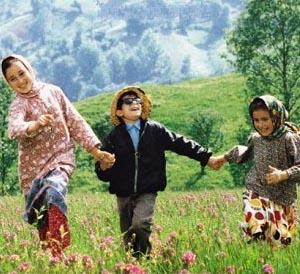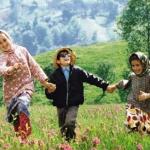Film Review: The Color of Paradise
Childhood is less than ideal for eight-year-old Mohammad, blind since birth. As if being blind weren't difficult enough, his mother is dead, his father is ashamed of him, and although he excels in his studies at a school for the blind in Tehran, he misses his sisters and grandmother back home on the family farm.
When we first meet Mohammad, he is the last of his classmates, forlornly waiting for his father to pick him up from school to return home for the summer. A trek by horseback takes him to his village for a joyful reunion with his sisters and grandmother. In a part of the world that is often depicted as parched and troubled, the family farm offers a refreshing glimpse into pastoral life outside the urban din of modern day Tehran.
Life is bliss for a few days, as Mohammad enjoys the familiar routine of family life, until his father apprentices him to a blind carpenter in a nearbyvillage. Mohammad's father has his sights set on marrying a woman from a wealthy family who knows nothing of his son. Against the wishes of grandmother, he feels that Mohammad would be best gotten out of the way, and that his affliction would be a less shameful stigma if he learned a trade.
At first glance, The Color of Paradise would seem to be a film about a blind boy named Mohammad. But as the story unfolds, it becomes clear that the boy's father is the central character, a deeply troubled man who rails at the heavens for his misfortunes. Nonetheless, he works hard to to achieve his simple dreams and provide a better life for his family. But when a mishap befalls him on a trip to the beach with his blind son, he must come to grips with his inner demons and the hand that fate has dealt him.
With its heart-wrenching story and its sympathetic characters, in a panoramic setting with specially enhanced sound effects, The Color of Paradise has been a favorite at film festivals around the world. A praiseworthy work that has earned its place in the archives of international film.
* * * * *
 ThingsAsian
ThingsAsian

















